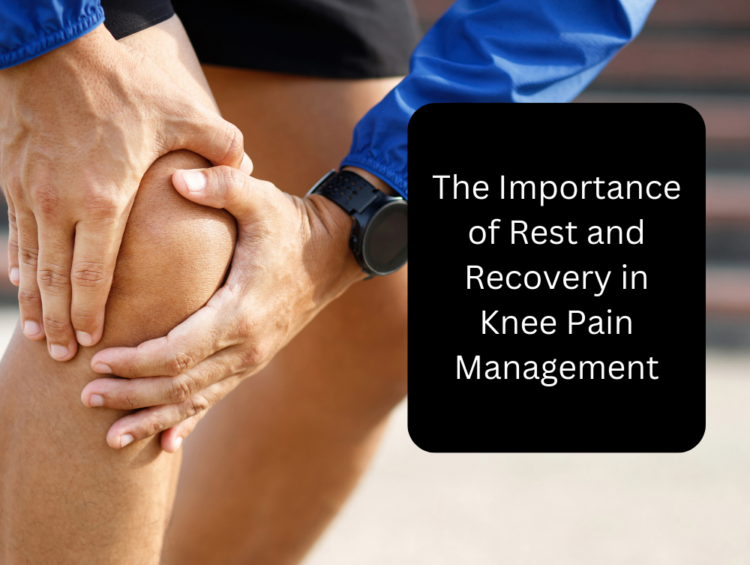Introduction
Knee pain is an exceptionally prevalent issue that knows no age or demographic boundaries. It’s an affliction that can strike anyone, regardless of their age, occupation, or level of physical activity. The triggers for this discomfort are as varied as the individuals who experience it. From sudden injuries and overuse from strenuous physical activities to the chronic ache of arthritis or underlying medical conditions, the sources of knee pain are manifold.
These symptoms can range from mild discomfort to debilitating agony, often accompanied by the telltale signs of inflammation and swelling that can seriously limit an individual’s mobility and overall quality of life. This understanding forms the cornerstone of our approach, and we passionately emphasize the pivotal role that rest and recovery play in effectively managing knee pain.
In the following sections, we will delve deeper into the various factors contributing to knee pain, the diverse symptoms it can manifest, and why rest, in particular, is of paramount importance, especially in the context of specific knee injuries.
Understanding Knee Pain
The knee is one of the most complex and crucial joints in the human body. It comprises a network of bones, cartilage, ligaments, and tendons, all working together to facilitate movement and bear the body’s weight. Knee pain can stem from a variety of sources, including injuries, overuse, arthritis, or underlying medical conditions.
Injuries are one of the leading causes of knee pain, ranging from traumatic incidents like sprains, strains, ligament tears, to fractures. These injuries can result from accidents, sports-related incidents, or even simple missteps.
Overuse injuries are also common, often linked to repetitive movements in activities like running, cycling, or intense physical labor. Conditions such as patellar tendinitis and iliotibial band syndrome can develop over time due to the strain placed on the knee joint.
Arthritis, both osteoarthritis and rheumatoid arthritis, is another cause of chronic knee pain. In these cases, the cartilage that cushions the joint deteriorates, leading to pain, stiffness, and inflammation.
Symptoms of Knee Pain
The symptoms of knee pain can vary depending on the underlying cause but typically include:
Pain: Knee pain can manifest as a dull ache, sharp stabbing pain, or constant discomfort. The severity may range from mild to excruciating.
Swelling: Inflammation and swelling are common symptoms, leading to a visibly enlarged knee and a reduction in the joint’s range of motion.
Stiffness: Knee pain often causes stiffness, making it challenging to bend or straighten the affected knee fully.
Clicking or Popping: Some individuals may experience clicking or popping sounds when moving their knee, indicating joint instability.
Weakness: Knee pain can result in muscle weakness in the surrounding areas, affecting the overall stability of the joint.
Read: Embarking on a Journey as a Travel Nurse
Rest and Recovery in Knee Pain Management
Rest plays a pivotal role in the recovery process after a knee injury. While it might seem like a passive approach, it’s crucial for a variety of reasons, especially for specific types of knee injuries.
Acute Injuries: Rest is particularly essential for acute injuries like ligament tears, strains, and sprains. These injuries can worsen with continued stress, making rest the first line of defense to prevent further damage and promote healing.
Inflammation Reduction: Rest helps reduce inflammation in the injured area. Inflammation can exacerbate pain and hinder the body’s natural healing mechanisms. By allowing the knee to rest, the inflammatory response can subside, facilitating the recovery process.
Pain Management: Rest and proper elevation can help alleviate pain by reducing the pressure on the injured knee. This can also reduce the need for pain medication and improve overall comfort during recovery.
Tissue Healing: The body’s natural ability to repair damaged tissue relies on rest. By minimizing stress and strain on the injured knee, you allow the body to concentrate its resources on healing, resulting in a faster recovery.
Preventing Recurrence: Rest is vital for reducing the risk of reinjury. Rushing back to activity too soon can lead to further damage and a prolonged recovery period.
Specific Knee Injuries Benefiting from Rest
Certain knee injuries and conditions benefit significantly from rest and a structured recovery plan. These include:
Ligament Tears: Injuries to the anterior cruciate ligament (ACL), posterior cruciate ligament (PCL), or medial collateral ligament (MCL) often require rest to allow the ligament to heal and regain stability.
Tendonitis: Conditions like patellar tendinitis and iliotibial band syndrome respond well to rest, as overuse is a common trigger for these issues.
Post-Surgery Recovery: After knee surgery, rest is vital for ensuring proper wound healing, reducing postoperative pain, and preventing complications.
Arthritic Conditions: In cases of arthritis, rest can provide relief from pain and inflammation, allowing individuals to better manage their symptoms.
Conclusion
Knee pain, in its various forms and intensities, can exert a profound and far-reaching influence on your daily life. From simple actions like walking and climbing stairs to engaging in your favorite physical activities, the mobility of your knee joint plays a pivotal role. However, when knee pain becomes a persistent companion, it can impose limitations on even the most basic movements, hindering your overall quality of life.
This discomfort, whether mild or severe, can have a domino effect, impacting your work, social life, and overall well-being. It’s not just a matter of physical discomfort; it can also lead to emotional and psychological stress. As such, it’s essential to recognize the importance of effective knee pain management, and a crucial aspect of this management is giving your body the time and space it needs to recover. In cases of knee injuries, the role of rest is nothing short of indispensable.
Allowing your body the opportunity to heal can yield multiple benefits, not least of which is a reduction in pain and inflammation. However, rest isn’t merely about comfort; it’s also about the prevention of further damage and the avoidance of potential reinjury, all of which contribute to a swifter, more effective recovery.
Understand that knee pain can be a deeply unsettling experience, one that affects not only your body but your mind and spirit as well. As a provider of holistic healthcare, we hold a profound appreciation for the significance of rest and recovery in the management of knee pain. Our mission is to guide you through the process of finding relief and restoring your knee’s optimal functionality, thereby enhancing your overall well-being.





